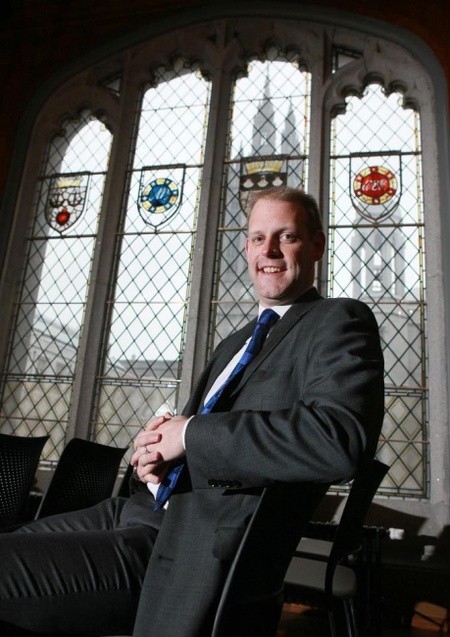Neil McLennan, Director of Leadership Programmes and Senior Lecturer, and a former Scottish Football Association qualified coach and former Senior List football referee, reflects further on leadership learning which might benefit Scotland's national team.
Last month I wrote about leadership in Scottish Football at a time when the Scottish Football Association started looking for a new national team manager. Almost three weeks on and an appointment has still not been made. Last weekend some pressure came from former players, like Charlie Adam, for an appointment to be made before English club teams started their hunt for managers next season, possibly snatching potential candidates for the Scotland job.
The blog post sparked some interesting conversations in the last few weeks, and since then further news has given fresh insights to leadership issues worth considering.
The timing of appointing the manager now appears to be critical. One might ask about contingency planning and consideration of organisations before they terminate senior level contracts. Succession is also a consideration for the leader themselves, especially if they see their leadership as servant in model and stewardship in reality. Perhaps the biggest dilemma of responsible leadership is identifying possible successor(s). Once leadership posts are vacated, the gap between the void and making an appointment is worth considering. How long can an organisation function without a formal leader? This is worth further study and insight. Often caretaker and temporary leadership fill the void. And where they replace toxic leadership, the new leader can be emollient, at least at first. A caretaker role, whilst presenting some challenges, also gives some freedoms which, in themselves, might contribute to success. We might also reflect on the mixed fortunes of Ole Gunnar Solskjær at Manchester United. He had a 73% win ratio as caretaker manager for nineteen games. As permanent manager for nine games Solskjær’s win percentage has dropped to 22%. Whilst many factors influence, the context of the leaders setting is worth reflecting on.
Last weekend’s Scottish club fixtures brought another novel insight to football leadership. Readers of my previous blog will remember that I floated the idea of some sort of distributed, collaborative or cooperative leadership model, citing that the Scotland national team had on two occasions in its history been chosen by a selection committee. Last week Partick Thistle’s manager Gary Caldwell took what was seen as an unusual step of doing just that. Partick needed a win in their away match to Queen of the South to avoid relegation from the Scottish Championship. Caldwell took what was seen as the unusual step of asking the players who they would pick for the starting elven. Caldwell’s assistant Brian Kerr communicated with the players using WhatsApp. Again this is of interest given my Business School blog on Leading by Tweeting.
The move backfired with one player leaking this new distributed leadership approach. Here two leadership questions arise. Firstly what to do with the player who breached trust. Or alternatively do we look positively on the leadership shown by the player whose ‘whistle-blowing’ highlighted concerns at this new approach? Such radical approaches are challenging for leaders to undertake and much consideration must be given to having the team on board. Harvard Professor Mark Moore’s work on creating organisational value is significant in his consideration of the authorising environment and when manageable risks can and cannot be taken.
Caldwell’s distributed approach did Partick Thistle no harm. Their 3-0 win over Queen of the South might now be looked upon for the approach taken. Since the match he has been quick to point out that despite the approach, he very much ‘carries the can.’
All of this in the space of weeks after my initial blog. One wonders if any of it will be reflected in an innovative new approach for Scottish football. Significantly however, the most intriguing conversation I had following my blog shifted the goalposts even further on leadership of Scottish football. Speaking about it with a retired leadership academic we discussed whether a woman will ever be appointed to the Scotland male national team manager role. Given the recent success of Scottish women’s football it surely cannot be ruled out. The list of female football directors and chairpersons is vast - Karen Brady at West Ham, Carolyn Radford at Mansfield Town, and north of the border Leanne Dempster at Hibs and Ann Budge at Hearts. The Scotland Women’s National Team are currently winning plaudits from many quarters. Head coach Shelley Kerr is on the shortlist for a Scottish Football Writers’ manager award. Her win percentage is 61% in the 21 games she has taken charge of. Only Alex McLeish’s 2007 tenure and Bill Stark’s one-game caretaker role exceed this win rate in the men’s game - McLeish with 70 percent wins and Stark winning his only game in charge. Whilst there are no female managers in Scottish male team dugouts just now, would it be that disruptive and could it work for the men’s national team? Given Caldwell’s risk and the apparent success, anything is possible and anything is worth a try. The only question is how much risk are leaders in football willing to accept?


